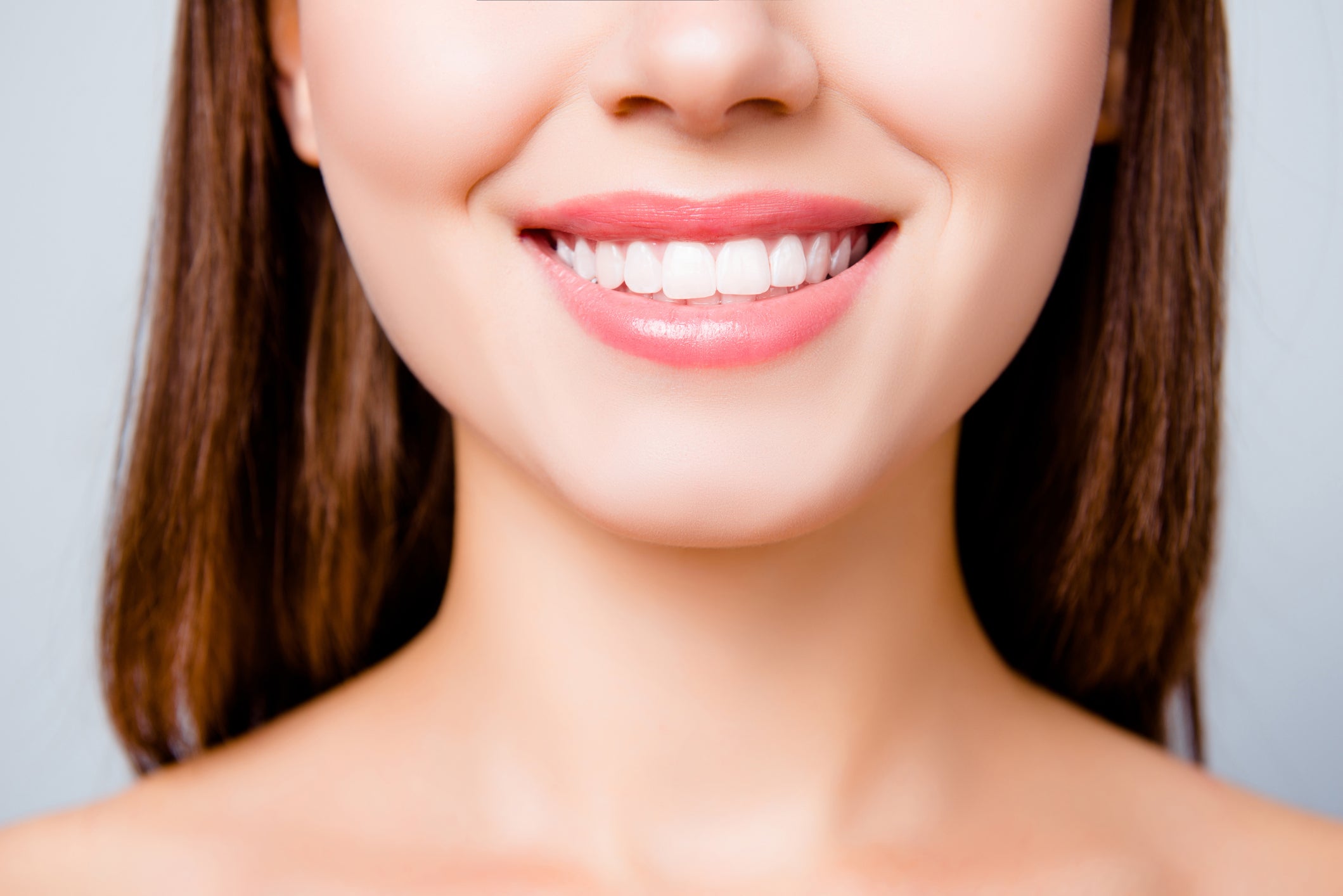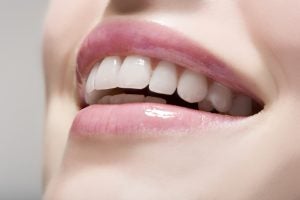-
Why Should You See a Cosmetic Dentist?

Are you unhappy with your teeth? If you find yourself covering your mouth when you laugh and smiling with closed lips for photos, you could benefit from seeing a cosmetic dentist. While general dentistry aims to preserve oral health, a cosmetic dentist focuses on improving the way your smile looks and feels. Here are the top reasons to see a cosmetic dentist.
- Yellow, stained teeth: Years of eating and drinking tooth-staining foods and beverages can leave your teeth looking yellow and dull. Fortunately, extrinsic stains like these are easy to remove with Zoom!® in-office whitening. In less than an hour, your teeth will be several shades whiter. Use at-home whitening products between visits to help your look last as long as possible.
- Discoloration: Intrinsic tooth discoloration can’t be corrected with whitening. Fortunately, you still have options! Veneers, or tooth-colored shells adhered to the front of your teeth, may be the best choice for giving your smile a bright new look.
- Uneven teeth: If your teeth have worn unevenly, they may now appear pointy, jagged, or misshapen. They may even be different sizes or lengths. Tooth reshaping/contouring is the cosmetic dentistry solution to this problem. With a specially designed tool, the dentist can gently reshape your uneven teeth for a more aesthetically pleasing smile.
- Missing teeth: Whether you had an infected tooth extracted or a traumatic injury left you with a gap in your smile, you can fill the hole with dental bridges or implants. A bridge anchors to dental crowns installed on the two adjacent teeth, while implants are self-supporting fixtures that mount directly to your jawbone.
- Broken, chipped, or fractured tooth: When a tooth is damaged, it’s important to act quickly to save it. Your options include dental crowns, veneers, and bonding (applying composite resin to the surface of the tooth to repair it).
- Cavities: Tooth decay can lead to cavities, which require a filling. If you currently have amalgam (metal) fillings, you can replace them with tooth-colored fillings made of composite or porcelain. This way, you can smile as wide as you want without anyone noticing your dental restorations.
- Crooked teeth: If you want a straighter smile, but you don’t want metal braces, consider what Invisalign® has to offer! The clear, plastic aligners are virtually invisible, gradually shifting your teeth into the desired position without anyone even knowing you have braces.
- Gummy smile: Excess gum tissue can affect your self-confidence and discourage you from smiling. Luckily, this condition is treatable using techniques such as dental crown lengthening, orthodontics, and oral surgery.
If you’re ready to enhance your smile, visit Park 56 Dental, the best cosmetic dentist in New York. We provide an array of personalized treatments designed to restore your self-confidence, many of which can be completed in one office visit. For more information about cosmetic dentistry, or to schedule a free consultation, please call us at (212) 826-2322 or contact us online today.
-
10 Ways to Prevent Tooth Enamel Loss

Enamel is the semi-transparent outer layer of your teeth that protects the more sensitive dentin and pulp beneath from the acids, chemicals, and temperature extremes your mouth endures when you eat and drink. Even though enamel is the hardest substance in the human body, daily wear and tear can eventually cause the surface of your teeth to wear away. Once you lose tooth enamel, it’s gone for good, so it’s important to do everything you can to protect it! Here’s how.
- Limit acidic foods and drinks: When you eat anything acidic, your tooth enamel softens temporarily and loses some of its mineral content. Your saliva slowly balances out the acidity in your mouth, but if this acid attack happens too often, your mouth may not have time to repair itself before some enamel is brushed away. To prevent this, cut back on alcohol, coffee, tea, soda, sports drinks, tomato sauce, and sour candy.
- Eat less sugar: The bacteria in your mouth feed on sugar, producing acid as a byproduct. This is why juice, candy, and other sweet foods are so bad for your teeth.
- Finish your meal with dairy: Enjoying a glass of milk or a piece of cheese at the end of your meal helps rebalance the acidic pH in your mouth.
- Rinse immediately: If you have a hankering for something sweet or acidic, reduce the damage by rinsing your mouth with water once you finish eating.
- Chew sugar-free gum after meals: Chewing gum stimulates saliva flow, which helps remineralize your enamel. Plus, mint gum freshens your breath, making it a win-win.
- Wait an hour to brush: It may sound counterintuitive, but you shouldn’t brush your teeth right after eating. This is when your enamel is weakest, so wait until it has time to harden again before brushing.
- Brush gently: Unless your dentist recommends otherwise, use a soft-bristled toothbrush. Then, brush gently to remove food particles and plaque without scrubbing enamel away.
- Brush with fluoride toothpaste: Fluoride has the amazing ability to remineralize your teeth, strengthening enamel in the process. That’s why it’s so important to use fluoride toothpaste and mouthwash.
- Wear a mouthguard: Nighttime tooth grinding can wear down your enamel. Ask your dentist about getting a custom mouthguard to protect your teeth while you sleep.
- Work with your dentist: Ultimately, the best way to keep your enamel intact is to visit the dentist regularly. A dental professional can spot early signs of erosion and recommend fluoride treatments, prescription toothpaste, and other personalized solutions to help you preserve your smile.
Ready to team up with the best dentist in New York? Look no further than Park 56 Dental! We can help you prevent tooth enamel loss and recommend dental restorations if your smile needs a boost. All the while, you’ll enjoy personalized, quality dental care in a spa-like environment. To get started, please call us at (212) 826-2322 or contact us online to request your free consultation.
-
How to Find the Perfect Dentist

When you’re looking for a dentist, the number of options available can be overwhelming. Factor in anxiety about going to the dentist, and it’s easy to see how finding a dentist could seem like a daunting task. Don’t worry! We’ve got some tips to help you find the perfect dentist for you and your family.
- Ask people you trust. Word of mouth can be the most effective way to find the right dentist. Make a list of dentists recommended to you by family members, close friends, co-workers, and your primary care physician. Don’t worry too much about whether the dentists are in your network; you can often maximize your insurance benefits out of network. Armed with your list, you can begin to narrow the search.
- Find a full-service dentist. Don’t choose a dental practice with limited specializations. Rather, look for one who performs a wide range of services, all in one practice. You don’t want to have to go through the process again when you need a different kind of dental work.
- Check the dentist’s credentials. Make sure your dentist is board certified and has a current state license as well as a clean disciplinary history. Healthgrades.com and your state website will have information about your dentist’s medical school, training hospital, certifications, and malpractice and disciplinary history. Look for solid credentials and plenty of experience.
- Read online reviews but don’t put too much stock in them. Patient reviews can give some insight into how the dental practice is operated. On the other hand, online reviews can be manipulated. Read them, taking note of what patients have to say, but pay special attention to the dentist’s responses to the reviews. If the dental practice responds in a positive way to online reviews, regardless of whether the review is positive or negative, it indicates that the dentists in the practice care about their patient.
- Tour the office. While you’re there, ask questions about things like office hours, technology, the dentists’ training, continuing education, their approach to preventive dentistry, emergency appointments, and financing. Note the cleanliness of the office, friendliness of the staff, and willingness to answer questions.
- Think about your personal preferences. Do you prefer a dentist of a certain gender? Are telehealth appointments important to you? Which dental services do you believe you’ll need most often? Is flexible scheduling a priority for you? When you meet a dentist who checks all the boxes and makes you feel comfortable, that’s probably the perfect dentist for you!
If you’re looking for the perfect dentist, choose the practice that was voted best dentist in NYC! At Park 56 Dental Group, we offer pediatric, prosthodontics, endodontics, oral surgery, Invisalign®, emergency, and sedation dentistry, all at the highest level of treatment. We serve the Midtown, Central Park, Upper East Side, Park Avenue, and all surrounding Manhattan and New York areas, with a patient-centered practice that has hours to fit your schedule. Schedule your complimentary consultation today by contacting us online or calling us at (212) 826-2322.
-
Why it’s Important to tell your Dentist about Allergies or Medical Conditions

When you go to see your dentist, you do it to take care of your teeth. That being the case, there’s no need to talk to your dentist about the rest of your body, right? Wrong. There are some very important reasons to tell your dentist about allergies and other medical conditions you may have. Here are some medical issues you should be discussing with your dentist.
- Allergies: It’s particularly important to tell your dentist about any allergies to medications or a latex allergy, since dentists use medicines and latex products when treating you. Other allergies could be important as well. If you have skin that is reactive to certain non-precious metals, it could indicate a metal allergy. If you were to get a metal filling, it could become a complicated problem. Provide your dentist with a full list of your allergies, and if any new allergies arise, amend the list.
- Bacterial Infections: Bacteria from an infection can get into your blood and travel throughout the body, even affecting the mouth. An infection in your body can cause problems in your mouth, so your dentist needs to know about any infections and how they’re being treated.
- Heart Trouble: Your dental medication and procedures can have an impact on your cardiovascular health, but heart disease can also put you at a higher risk for oral issues like periodontal disease. If you have a heart condition or you’ve had a heart-related treatment or procedure, tell your dentist. Information your doctor needs to know includes things like artificial heart valves, transplant issues, heart surgery, pacemakers, and endocarditis.
- Pregnancy: If you’re pregnant, your dentist may want to change some things about treating you, like the frequency of x-rays.
- Chronic Conditions: Asthma and other breathing problems should be reported to your dentist. Epilepsy is another condition your dentist should be aware of. Essentially, any condition that might have an effect on medication your dentist uses in treating you should be reported.
- New Medication: Some medicines cause symptoms like decreased saliva production, tooth sensitivity, and trouble with your oral soft tissues. Any medication, whether over the counter or prescribed, is something your doctor should know about.
- Surgeries: Surgery increases your risk of infection, so let your doctor know if you’ve had any recent surgeries.
- Potentially Hazardous Habits: Lifestyle habits like drinking alcohol or using tobacco are important for your dentist to know. Regular drinking increases the risk of tooth decay, and tobacco use has been linked to many oral health issues. Be specific about your lifestyle choices because some things affect your mouth more than others. Chewing tobacco, for instance, has a different impact than cigarettes. Occasional drinking affects your mouth differently from daily drinking.
At Park 56 Dental Group, we offer pediatric, prosthodontics, endodontics, oral surgery, Invisalign®, emergency, and sedation dentistry, all at the highest level of treatment. We serve the Midtown, Central Park, Upper East Side, Park Avenue, and all surrounding Manhattan and New York areas, with a patient-centered practice that has hours to fit your schedule. Schedule your complimentary consultation today by contacting us online or calling us at (212) 826-2322.
-
Dental Advice for Parents

When you’re a parent, your child’s health is your top priority. That’s why parents know how important it is to teach children good dental habits. If you’re a new parent, you probably have many questions about dental care for your child. Don’t worry, our pediatric dentistry practice is one of the reasons we’re the best dentist in NYC and we have the answers you need.
- How can I help my child establish good dental habits? The best thing you can do is to be a good role model. Teach your children to brush and floss by modeling those behaviors and make it part of your family’s daily routine. Teach them how much toothpaste to use, how to floss and use mouthwash, and why it’s important to visit the dentist regularly. Make brushing fun, letting your kids pick their own toothbrushes to make it more appealing. Consider a toothbrush with a musical timer that lets kids know how long to brush.
- When should children start brushing and flossing? Before your baby’s first tooth even emerges, you should be caring for their dental health. Wipe little gums with a clean, damp washcloth to remove bacteria, and when your baby gets teeth, brush them with an infant toothbrush. Use very little toothpaste, only about as much as a grain of rice, to minimize any toothpaste being swallowed. When your child has two teeth that touch, begin flossing them. Children should learn how to spit when brushing when they’re about 2, and children younger than 8 should always be supervised to make sure they don’t swallow the toothpaste.
- What’s the best diet advice for a healthy mouth? First, never put a baby to bed with a bottle, whether juice, formula, or milk. Limit sugary foods and drinks to prevent tooth decay, and encourage your child to drink water and eat a diet full of vegetables and fresh fruit. Cheese is also a good snack, because it contains calcium important for tooth enamel and stimulates saliva to help wash unwanted sugars off of the teeth.
- When should my child see a dentist for the first time? According to the American Dental Association (ADA) children should see a dentist by their first birthday. The dentist will explain proper brushing and flossing techniques and do a checkup while your baby sits on your lap. After that, your child should have dental checkups twice a year. Starting dental visits early helps get your child comfortable with the dentist so there will be less anxiety in later years.
If you’re looking for a pediatric dentist, choose the best dentist in NYC. At Park 56 Dental Group, we offer pediatric dentistry, along with our other services, at the highest level of treatment. We serve the Midtown, Central Park, Upper East Side, Park Avenue, and all surrounding Manhattan and New York areas, with a patient-centered practice that has hours to fit your schedule. Schedule your complimentary consultation today by contacting us online or calling us at (212) 826-2322.
-
Being Voted NYC’s Best Dentist

If you’re looking for the best dentist in NYC, look no further than Park 56 Dental Group. We’ve been voted NYC’s best dentist, and it’s no wonder. We provide personalized, quality dental care to a clientele that appreciates our comfortable, spa-like environment.
Our status as the best dentist is confirmed by our many five-star reviews. Clients say we’re “very thoughtful, caring and all around well organized”, “kind and wonderful”, “compassionate and professional”, and that our practice “makes going to the dentist a pleasure”. One customer characterized our staff by saying the “entire office was informative, compassionate and worked together like a team.” What makes us the best dentist in NYC? We think it’s a combination of several factors.
- Comprehensive Services: We provide routine dental services and so much more! Taking care of your teeth is an important part of caring for your overall health, so visiting the dentist regularly is vital. We provide oral cancer screenings for your peace of mind, and our cleanings and oral exams can save you from dental care problems and a wide range of health issues. We also offer pediatric, prosthodontics, endodontics, oral surgery, Invisalign®, emergency and sedation dentistry
- Expert Cosmetic Dentistry: Our restorative dentistry will improve your smile and boost your confidence. The services we provide include teeth whitening, contouring/tooth reshaping, bonding, bridges, veneers, dental implants, tooth colored fillings, and smile makeovers.
- Quality Care in a Comfortable Facility: We’re committed to providing your entire family with safe, gentle, high-quality dental care. We’re sensitive to your needs and want you to be comfortable while we provide you with the best care possible. Feel free to stop by our office and take a tour of our facilities.
- Patient-centered Practice: Our knowledgeable, compassionate dentists and staff excel at providing personalized care, and we’ll work together to meet your individual needs. We’ll answer any questions you may have, providing expert advice, and we’ll help if you struggle with dental anxiety. We want you to feel comfortable, safe, and relaxed at our office, and we even offer sedation dentistry for patients who request it. You can meet our team, take a walk through our office and treatment areas, and learn more about the treatments we provide.
If you want to trust your dental care to the very best dentist in NYC, call Park 56 Dental Group. We offer pediatric, prosthodontics, endodontics, oral surgery, Invisalign®, emergency, and sedation dentistry, all at the highest level of treatment. We serve the Midtown, Central Park, Upper East Side, Park Avenue, and all surrounding Manhattan and New York areas, with a patient-centered practice that has hours to fit your schedule. Schedule your complimentary consultation today by contacting us online or calling us at (212) 826-2322.
-
Foods and Drinks that Erode Teeth

You try to stick to a healthy diet, avoiding sugary sodas and sticky candies that can damage your teeth. However, sometimes even healthy foods can cause tooth erosion. It pays to be mindful of the signs of eroded tooth enamel and avoid foods that can negatively impact the health of your teeth.
First, what are the symptoms of tooth enamel erosion? You might notice that your teeth feel sensitive when you eat or drink something hot or cold. You might also notice that your fillings or even your teeth have changed color. If your enamel erodes to an extreme degree, you might lose a tooth or develop an abscess. So, what foods should you avoid to prevent these problems?
- Citrus Fruit: The high acid content in citrus can damage your teeth. In fact, even things with citrus flavoring can wear down your enamel.
- Tomatoes: Tomatoes are good for your body, but they can be rough on your teeth. This is because they’re acidic. If you eat tomato sauce on pasta, you’re doing your teeth a double disservice, because the tomatoes break down your enamel and the carbs in pasta feed cavity-causing bacteria.
- Dried Fruits: Even though it’s nutrient-dense, dried fruit can damage your teeth. It’s sticky, and has sugar, so if you don’t immediately get all that sticky fruit off of your teeth, the sugar will erode your enamel.
- Carbonated Beverages: Even when they’re sugar free, soft drinks have carbonation that can wear away your enamel. You’re better off with unsweetened tea or water, but if you do drink soft drinks, don’t brush immediately. You might think that cleaning the soda off of your teeth immediately is a good idea, but brushing after your enamel has been weakened by carbonation can erode it further.
- Pickles: Because of the acid required for the pickling process, pickles can cause staining and tooth erosion. Some pickles also have sugar, which makes them even more likely to cause cavities.
- Wine: Both white and red wine have enamel-softening acid, but red wine also contains compounds called tannins that can dry your mouth and stain your teeth.
- Sports Drinks: These beverages are high-carb, sugary, acidic, and thick enough to stick to your teeth.
- Crackers: Because they’re refined carbohydrates, crackers can cause inflammation in the body. Crackers also stick to your teeth, which can promote tooth decay.
- Sugar: Of course, you’ve known since childhood that sugar causes cavities. It’s important to note, however, that sugar isn’t only found in sweet treats, but also in processed foods.
At Park 56 Dental Group, we offer pediatric, prosthodontics, endodontics, oral surgery, Invisalign®, emergency, and sedation dentistry, all at the highest level of treatment. We serve the Midtown, Central Park, Upper East Side, Park Avenue, and all surrounding Manhattan and New York areas, with a patient-centered practice that has hours to fit your schedule. Schedule your complimentary consultation today by contacting us online or calling us at (212) 826-2322.
-
How to Overcome Dry Mouth

Does your mouth feel uncomfortably dry? Many adults suffer from dry mouth, known medically as xerostomia or hyposalivation, which happens when the salivary glands don’t produce enough saliva. It’s a problem, because saliva is necessary for washing away debris and protecting your mouth from harmful acids. Without enough saliva, the mouth is vulnerable. Causes of dry mouth vary, but sometimes home remedies can provide some relief.
First, let’s discuss possible causes of dry mouth. It could be as simple as dehydration, or it could be the result of a medication you’re taking. Smoking can cause dry mouth, as can drinking alcohol. Sometimes, though, dry mouth is the result of a medical condition like diabetes, kidney disease, Parkinson’s disease, immune/autoimmune disorders, anxiety or depression, anemia, or nutritional deficiency. If you think your dry mouth might be the result of an illness, see a doctor to rule it out before trying these home remedies.
- Hydrating can alleviate dry mouth. Drinking water can help with mild dehydration, and it can also rinse your mouth if your saliva isn’t getting the job done. Limit your caffeinated and alcoholic beverages, as these can be dehydrating.
- Mind your dental products. Don’t choose a mouthwash that contains mouth-drying alcohol. Instead, look for one created to help alleviate dry mouth. Ask your dentist if a prescription fluoride toothpaste, rinse, or gel might be beneficial.
- Try sugar free candy or gum. Chewing gum or sucking on hard candy can increase the flow of saliva. Just be careful to choose sugar-free products, because a dry mouth is more susceptible to cavities. Look for gum with the ADA seal of acceptance.
- Use a humidifier to moisten your mouth. Breathing in dry air doesn’t help a dry mouth, so use a humidifier, especially when you’re sleeping.
- Breathing through your nose may help. Breathing through your mouth can cause it to become dry, so if you’re having trouble breathing through your nose because of congestion or allergies, talk to your doctor.
- Don’t smoke. Smoking cigarettes actually slows down saliva production. For a healthy mouth, avoid all kinds of tobacco products.
- Try some over-the-counter products for dry mouth. There are many different saliva substitutes on the market, from sprays to rinses to specially-formulated toothpastes. Just be aware that these may not be a good long-term solution.
- Take your vitamins. Vitamin supplements, particularly vitamin C and vitamin B complex, can help with inflammation and boost your immune system, which may help alleviate dry mouth. There are also a number of herbal remedies for dry mouth, including aloe vera, ginger, hollyhock root, and marshmallow root.
Whenever you have a question about your oral health, it’s good to have a dentist you can trust for answers. At Park 56 Dental Group, we offer pediatric, prosthodontics, endodontics, oral surgery, Invisalign®, emergency, and sedation dentistry, all at the highest level of treatment. We serve the Midtown, Central Park, Upper East Side, Park Avenue, and all surrounding Manhattan and New York areas, with a patient-centered practice that has hours to fit your schedule. Schedule your complimentary consultation today by contacting us online or calling us at (212) 826-2322.
-
Oral Cancers of Which to Be Aware

You know that visiting your dentist regularly can help protect against cavities, but did you know that these regular checkups can also help protect you from cancer? During a routine dental visit, your dentist will screen you for signs of oral cancer. This is important, because the earlier cancer is detected, the easier it is to fight. Do you know about the different types of oral cancers?
- Lip Cancer: The most common oral cancer, lip cancer primarily affects men. People sometimes miss the common symptoms of lip cancer because they think it’s a cold they can’t shake or a toothache. Be vigilant for signs of lip cancer, including a sore on the lip that doesn’t heal, persistent lip pain or numbness, a lump, thickening, or white or red patch on the lip, or a neck mass. Surgery is often the first step in treating lip cancer, but it’s also treated with radiation therapy, chemotherapy, and targeted drug therapy.
- Mouth Cancer: This cancer can develop in any part of the mouth, including the tongue, gums, and lips. As with other types of oral cancer, symptoms can seem like a cold that won’t go away. They also include continual tongue or jaw pain, a thickening or lump inside the mouth, a red or white patch on the gums, tongue, tonsil, or the mouth’s lining, or trouble swallowing or chewing. It might be hard to move your jaw or tongue. If surgery is performed to remove a tumor from the mouth, it may be necessary for the surgeon to reconstruct part of the face afterward. Doctors also use radiation, chemotherapy, immunotherapy, and targeted drug therapy to fight mouth cancer.
- Tongue Cancer: Tongue cancer forms in the front two-thirds of the tongue. If cancer forms in the back third of the tongue, it’s considered a kind of head and neck cancer. In addition to the typical oral cancer symptoms, tongue cancer causes tongue or jaw pain, a thickening or lump in the mouth, a sore throat, or the feeling that something is stuck in the throat, difficulty chewing or swallowing, or a white or red patch inside the mouth. Sometimes tumor resection for tongue cancer can be minimally invasive. Chemotherapy, radiation, and targeted drug therapies are also treatment options.
How can you reduce your risk of oral cancers? A healthy lifestyle can help. Don’t smoke or use any other tobacco products, and limit your alcohol consumption. Maintaining a healthy weight, eating a nutrient-dense diet, and protecting yourself from UV rays are all things that help your overall health and lower your risk of oral cancer.
At Park 56 Dental Group, we offer pediatric, prosthodontics, endodontics, oral surgery, Invisalign®, emergency, and sedation dentistry, all at the highest level of treatment. We serve the Midtown, Central Park, Upper East Side, Park Avenue, and all surrounding Manhattan and New York areas, with a patient-centered practice that has hours to fit your schedule. Schedule your complimentary consultation today by contacting us online or calling us at (212) 826-2322.
-
Why You May Still Have Bad Breath Even After Brushing and Flossing

You brush, you floss, you rinse, and you may even chew gum. So why do you still have bad breath? Bad breath, also called halitosis, is an embarrassing condition. It commonly comes from different parts of the oral cavity, but can sometimes be caused by an underlying health issue. How can you identify the cause and get rid of bad breath? Let’s look at some common scenarios that lead to halitosis.
- The most straightforward cause of bad breath is a dirty mouth. You’ve probably already tried brushing and flossing, but let’s discuss it just to cover all the bases. Bacteria, food particles, and mucosal cells your body sheds in your mouth can all lead to bad odors, so brushing thoroughly is your first line of defense against halitosis. You have to really get into every nook and cranny of the mouth, and if you have crooked teeth this can be difficult. If it seems like your crooked teeth are harboring odors, consider braces to improve your oral hygiene. And here’s something you may not know: the tongue is the most common place for bad breath to originate, because people often forget to brush their tongues. If you think your tongue may be the culprit, you can brush it with your toothbrush or get a tongue scraper.
- Gum (periodontal) disease can cause bad breath. If you’ve been lax with your dental hygiene, allowing plaque to accumulate around the teeth, you may end up with a tartar build up. This can cause gum disease, known in the early stages as gingivitis. This is an infection of the gums, but as it advances, it can cause the bone around your teeth to deteriorate and decay. As you can guess, this smells unpleasant. Regular dentist appointments are the only way to identify and stop the progress of periodontal disease.
- A dry mouth can have a bad odor. Saliva flow is necessary to keep the mouth free from debris, so if your mouth is dry, it can lead not just to bad breath but also to cavities and gum disease. Some medications can cause dry mouth, as can alcohol and tobacco products. Talk to your dentist about dry mouth treatment if this seems to be your problem.
- Health problems can cause halitosis. Post-nasal drip from a sinus infection, cold, flu or strep throat can attract odor-causing bacteria. Acid reflux and chronic conditions like diabetes, kidney failure, liver failure, peptic ulcer, or intestinal blockage can all be the root of bad breath.
To keep your mouth healthy, clean, and smelling good, regular dental appointments are important. At Park 56 Dental Group, we offer pediatric, prosthodontics, endodontics, oral surgery, Invisalign®, emergency, and sedation dentistry, all at the highest level of treatment. We serve the Midtown, Central Park, Upper East Side, Park Avenue, and all surrounding Manhattan and New York areas, with a patient-centered practice that has hours to fit your schedule. Schedule your complimentary consultation today by contacting us online or calling us at (212) 826-2322.
.
RECENT POSTS
categories
- Uncategorized
- Cosmetic Dentistry
- Veneers
- Healthier Teeth
- Teeth Whitening
- Dental Health
- Video
- Dental Emergencies
- Invisalign
- Dental Implants
- Root Canal
- Sedation Dentistry
- Infographic
- Dental Crowns and Bridges
- Dental Anxiety
- Gum Disease
- COVID-19
- Bad Breath
- New York Dentist
- Cut out sugar
- General Dentistry
- Oral Health
- Oral Cancer
- Dry Mouth
- Gum Health
- Toothache
